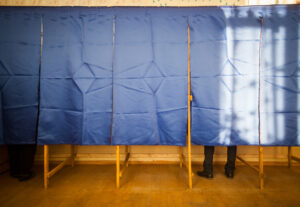
Anxiety and reflection on what the ballot box of June 9 will finally produce is expressed by party circles, with the political scene facing the tendency for a “revenge” vote, as stated by a portion of the electorate. A behavior that is found both in surveys and from the contact of party officials with the public.
A part of the electorate, especially among young people, declares that they will make choices beyond the traditional parties. , mainly the big ones, considering that in this way they will send a message to the political system. They declare an intention to vote either for independent candidates, or for extreme situations, or for new political formations.
What political circles indicateis that this choice is declared as a conscious criterion as a political choice to punish the traditional parties, but it is not accompanied by corresponding political selection criteria in what ultimately results in their vote.
In other words, on the one hand they want to send a message that they do not vote for a traditional party because they are disappointed with its policies or because they consider that they do not provide solutions to their problems or for various other reasons, but at the same time, the choice of where their vote will end up is not made with the same criteria. In other words, they don't choose who to vote for because they think that the particular party or candidate is better than the traditional options and maybe they don't even care. they know how and to what extent it will affect the outcome of the ballot box and whether it will also have an impact on the allocation of seats. In this particular chapter there are two unsettled factors that cannot be estimated and predicted with certainty. The first has to do with the eventual participation in the ballot box of those who appear to have this behavioral tendency and the second with how much after all, if they go to the polls, they will do what they say.
A portion of the electorate that says it will vote for anything other than traditional parties is estimated not to go to the polls to vote. and his anger will be “discharged” by abstinence. The percentage of these individuals cannot be predicted. The greater the percentage that will not go to vote for the person who declares that they will vote, the smaller will be the effect it will have on the final result.
The same applies to people who, while declaring that they will vote for something else, when they finally get to the ballot box not to implement their “threats”. And this can be done for various reasons. At the same time, of course, the equation must also include the fact that there may also be a “hidden” vote, i.e. people who will make other choices than they have traditionally made, but for various reasons do not express their intention.
“Apolitical” behavior at the ballot box
There is much debate as to whether a large part of society tends to behave at the ballot box with non-political criteria and if he makes clear choices based on non-political criteria. Of course, there is also the opinion that the choice not to vote for traditional parties by making other choices is his way of sending political messages.
A trend that was recorded to some extent in the previous ones as well presidential elections.
In any case, this trend recorded and which is found not only in the case of the European elections but also in the local elections in some municipalities, is cause for concern. The point, of course, is that this reflection should continue even after the elections in order to search for answers.




